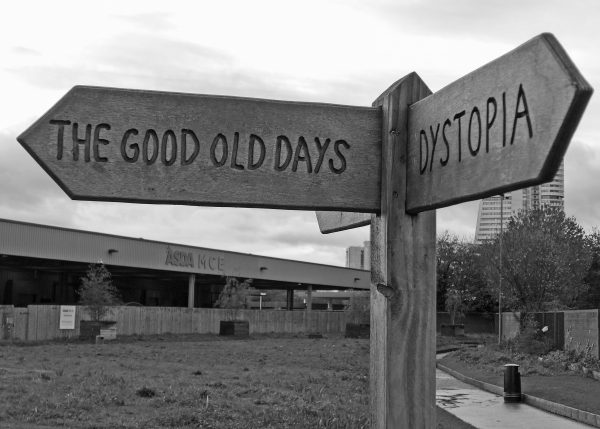It’s terrifying when your dystopian nightmares begin to come true.
Donald Trump is consolidating a circle of extremist advisers. Hardline restrictions on immigration are going up, regulations on Wall Street are tumbling down, and ordinary Americans can no longer agree on simple truths, let alone politics.
Abroad, Europe may be splintering, too, Asia looks volatile, and wars continue to rage in the Middle East. And everywhere, climate change creeps forward.
For me, however, the rise of the Trump era held a special terror.
My novel Splinterlands, which I finished in March 2016 and published in December, imagines a world that breaks into a million little pieces. It begins with the destruction of Washington, DC by a terrible storm — which I called Hurricane Donald — and goes downhill from there.
I tell the story of the unraveling of a family, which takes place against the backdrop of the break-up of the European Union, the collapse of China, the disuniting of the United States, and a massive financial crisis that wipes out the middle class everywhere.

(Photo: Tim Green/Flickr)
After submitting the final draft of the book to my publisher, I watched in bewilderment as the British public voted to withdraw from the EU. I was astonished some months later when the American public elected Donald Trump. And I was dismayed to watch the new administration begin to undermine U.S. democracy even before it officially took office.
I also felt a strange sense of déjà vu. It was a feeling akin to traveling back in time to watch the unfolding of an assassination or the lead-up to a world war. I’d already gamed out these scenarios when I was plotting my novel.
I’m no Nostradamus, and I didn’t intend Splinterlands as a prediction of the future.
When I was writing the book, I was concerned about the rise of far-right extremists, the rollback of democracy, and growing divisions here and abroad. And the half-measures the international community adopted to address climate change didn’t bode well for the health of the planet either.
I wanted my new novel to serve as a wake-up call. The world — and our country — could easily fragment, I warned, if we didn’t pay more attention to the sources of the new populist nationalism.
Economic globalization was benefiting some and leaving others behind. Faith in the democratic process was eroding as political elites engaged in corruption. Social media was undermining the distinction between real and fake news.
In past eras, progressives challenged these developments with calls for greater economic equality, more democracy, and solidarity across social identities. But mainstream progressive parties have often backed the same 1 percent-friendly policies as the right, leading to skyrocketing inequality.
The decline of the left has provided enormous political opportunities for the far right.
They’re climbing in the polls all over Europe. And here in the States, the white-supremacist alt-right played a critical role in getting Donald Trump elected.
But novelists don’t write dystopias because they think the dismal future they portray is inevitable. 1984, Brave New World, The Handmaid’s Tale: These were all calls to arms. If humanity didn’t change its ways, the novelists warned, those dystopias would be more likely.
Americans, fortunately, are already responding to the threat.
The protests following Trump’s inauguration brought millions of people onto the streets. And the executive order banning Muslims from seven countries from entering the United States has generated unprecedented backlash.
The United States is divided, but still it stands.
I’m terrified. But I’m also hopeful. My novel Splinterlands remains mostly fiction, and I’ll work hard with millions to keep it that way.
This piece was reprinted from Other Words by RINF Alternative News with permission.







